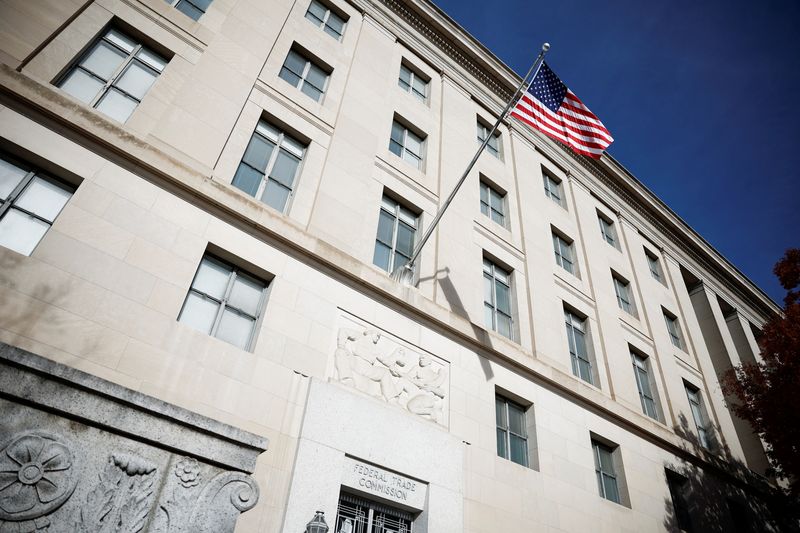
By Jody Godoy
(Reuters) – The U.S. Federal Trade Commission’s merger-busting, antitrust enforcement powers are coming under threat as conservatives look to harness President-elect Donald Trump’s support for limiting government.
On Tuesday, U.S. Representative Ben Cline, a Republican from Virginia, reintroduced the One Agency Act, which would remove the FTC’s antitrust authority and give it to the U.S. Department of Justice. The two agencies have shared federal antitrust jurisdiction, intended to guard against anticompetitive business behavior, for more than 100 years.
Outgoing FTC Chair Lina Khan’s skeptical stance towards company mergers and expansive view of the agency’s authority drew criticism from some in the business community and fueled Republican arguments to dial back the agency’s power.
Cline’s proposal – which was hinted at in the Heritage Foundation’s Project 2025 policy platform – will test Congress’ willingness to streamline the U.S. government through legislation, a key pillar of Trump’s agenda.
Cline, who met in December with Trump’s government efficiency consultants Elon Musk and Vivek Ramaswamy, said his bill fits with their efforts.
“Consolidating antitrust authority under the Department of Justice is an efficiency measure that is going to improve antitrust oversight,” Cline told Reuters in an interview on Tuesday.
By law, the DOJ has sole antitrust jurisdiction over some industries. The rest is divided up among the two authorities. The FTC takes the lead on pharmaceutical and hospital probes, while the DOJ oversees healthcare, for example.
For Big Tech and AI, the two agencies have split responsibility down the middle for probes into unfair market practices, with the FTC looking into Microsoft (NASDAQ:MSFT) and OpenAI and handing Nvidia (NASDAQ:NVDA) over to the DOJ, despite having successfully blocked Nvidia’s bid to acquire chip designer Arm in 2022.
RESTRUCTURING
The bill would combine the FTC’s Bureau of Competition, which has around 700 full-time employees and a budget of $213 million, with the DOJ’s antitrust division, which has around 900 employees and a budget of $225 million.
Both agencies are largely funded through the fees companies pay when they file for merger review.
The bill would allow the head of the DOJ’s antitrust division to restructure the merged agency. Cline did not have an estimate of how many positions could be made redundant.
The bill was first proposed in 2020 by U.S. Senator Mike Lee, a Republican from Utah, who is expected to lead the antitrust subcommittee next year.
Democrats did not support the bill. It is not clear whether Cline’s version will be combined with future legislation under a rule that could allow it to pass with Republicans’ narrow majority in Congress.
The idea of consolidating antitrust enforcement goes back decades, as does pushback against it. A bipartisan working group concluded in 2007 that the costs would exceed the benefits.
Critics say the two agencies are a successful tag-team. U.S. Representative Jerry Nadler, a Democrat from New York, called the bill an attempt to “abolish the antitrust police” at a hearing in April.
Nadler warned at the hearing that the bill would effectively repeal the FTC’s broad authority to protect against unfair methods of competition under the FTC Act, which it used in 2024 to sue pharmacy benefit managers and pass a ban on worker noncompete agreements.
Putting the DOJ in charge of antitrust enforcement would hand the White House more control, because the president can fire political appointees at the DOJ, which is an executive branch agency. The FTC, in contrast, is a bipartisan independent agency, whose commissioners can only be fired with cause.
Proponents say that would make antitrust enforcement more accountable to voters, while critics say it would diminish oversight.
The FTC’s structure and authority also face court challenges from Meta Platforms (NASDAQ:META), Intuit (NASDAQ:INTU), Walmart (NYSE:WMT) and others the FTC has sued, which Cline sees as another reason to lessen the FTC’s jurisdiction.
“These challenges will take years to go through litigation and appeals. But Congress can protect federal antitrust authority now,” said Cline at the April hearing.






